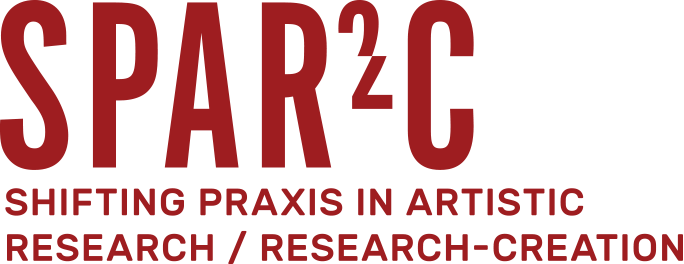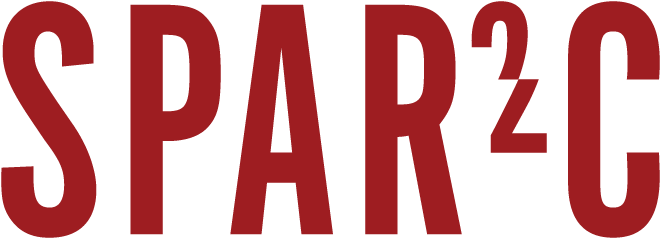
Resources
Selected resources (bibliography, journals, labs, and networks) on research-creation practice and theory.
FOLLOW US
Research-Creation Journals
Art/Research International: A Transdisciplinary Journal
Online journal. Art/Research International is a forum dedicated to exploring and advancing art as and/or within the research process across disciplines and internationally.
* * *
Art and Research: A Journal of Ideas, Contexts and Methods
Online journal. Based in UK. Art & Research is an artist-led, internationally peer-assessed open access e-journal of Research in Fine Art Practice, focused upon questions, contexts and methodologies of artistic research and practice.
* * *
Online journal. An open-access journal for research-creation sponsored by the Sense Lab. It publishes articles, short texts and/or other forms of expression actively exploring such issues as: (inter/trans/non) disciplinarity; the emergence of new modes of collaboration; micropolitics and the life and death of institutions; creativity, subjectivity and collectivity in cultural production; the ethics of aesthetics; the aesthetic as ethics.
* * *
Cultural Studies ↔ Critical Methodologies
Online Journal. Cultural Studies ↔ Critical Methodologies (CSCM) publishes open-peer reviewed research articles, critical analyses of contemporary media representations, autoethnography, poetry, and creative non-fiction. CSCM provides an explicit forum for the intersections of cultural studies, critical interpretive research methodologies, and cultural critique.
Online journal. An international, online, Open Access and peer-reviewed journal that disseminates artistic research from all disciplines
* * *
MaHKUscript: Journal of Fine Art Research
Online journal. A peer-reviewed international platform for artists, curators, theorists, research students and educators who consciously integrate research in their working practice.
* * *
Online journal. PARSE is a research publishing platform committed to the movement back and forth between analysis and creation, between meaning-making and the analytics of meaning, between construction and re-construction.
* * *
Online journal. An Open Access peer-reviewed experimental journal. The mandate of the journal is to create an interdisciplinary international dialogue for scholars to explore the “term” mobilities in all of its many manifestations.
Research-Creation Selected Bibliography
Research-Creation: Intervention, Analysis and ‘Family Resemblances.’ (Chapman & Sawchuk, 2012)
Article. Proposes four overlapping valences for research-creation practice: research-for-creation, research-from-creation, creative presentations of research, and creation-as-research.
* * *
Arts-based Research : A Critique and a Proposal (Jagodzinski & Wallin, 2013)
Monograph. In this book, the authors argue for blurring the boundaries of arts-based research in the field of art education by proposing arts-based research as the event of ontological immanence, which as such constitutes a betrayal of prevailing cultural assumptions and normalized research representations.
* * *
Method Meets Art: Arts-Based Research Practice (Leavy, 2009)
Monograph. Presents a comprehensive introduction to arts-based research (ABR) practices. Focussing on six major ABR genres (narrative inquiry, poetry, music, performance, dance, and visual art), Leavy discusses the kinds of research questions these innovative approaches can address and offers practical guidance for applying them in all phases of a research project.
* * *
Monograph. Introduces and discusses research-creation within the field of music, with features an overview of the historical emergence of RC in Quebec and Canada. It includes significant discussion on the pedagogical potential of RC within the university environment, specifically as it relates to music. Includes information about advising graduate student research-creation projects in music.
* * *
Article. Engages with Guattari’s query about, how to make a classroom operate like a work of art? Guattari’s thinking engenders a way of thinking about art as an affective event that has the capacity to invent new relations and new ways of learning. Claiming that affect and movement are crucial to new materialist research, Rotas and Springgay attend to concepts like “objectile” and “death perception” and Deleuze’s movement-image and time-image. They re-turn to a methodology of research-creation as diagrammatic, further considering implications of an enfolding, affective, moving ecology for educational research.
Rotas, N. & Springgay, S. (2014). How do you make a classroom operate like a work of art? Deleuzeguattarian methodologies of research-creation. International Journal of Qualitative Studies in Education, 28(5), 552-572.
* * *
Becoming More than it Never (Actually) Was: Expressing Writing as Research-Creation (Truman 2016)
Article. Combines Chinese literary theory and new materialism with ongoing research into creative writing. Author discusses how language and writing can be approached using new materialist theories. Entering into a creative non-fiction “research-creation” piece explores how creative writing can be a more-than-representational practice and how words can heighten and/or dampen affective production, experimenting with sub-text, format, and sensorial evocations. Truman considers the potentialities and caveats of teaching creative-nonfiction writing to high school students.
Truman, S. E. (2016b). Becoming more than it never (actually) was: Expressive writing as research-creation. Journal of Curriculum and Pedagogy, 13(2), 136-143.
Knowing & Knots: Methodologies and Ecologies in Research-Creation (Loveless [Ed.], 2019)
Edited volume. Canadian researchers discuss how research-creation is conceived and actualized by practitioners in the interdisciplinary humanities, and how research-creation prompts critical new directions in the academy today.
* * *
How to Make Art at the End of the World : A Manifesto for Research-Creation (Loveless, 2019)
Monograph. Explores research-creation as interdisciplinary praxis that stands on the shoulders of decades of feminist, de-colonial, psychoanalytic, and queer theoretical interventions into academic spaces.
* * *
Ten Propositions for Research-Creation (Manning, 2016)
Article. A short article that offers ten propositions on research-creation in order to underline how and why research-creation works to form new modes of knowledge, many of which are not intelligible and/or have no means of evaluation within current disciplinary models.
* * *
Alien Agency: Experimental Encounters with Art in the Making (Salter & Pickering, 2015)
Monograph. An investigation into what happens in creative practice when the materials of art and research behave and perform in ways beyond the creators' intentions.
* * *
Thought in the Act: Passages in the Ecology of Experience (Manning & Massumi 2014)
Monograph. Combining philosophy and aesthetics, Thought in the Act is an exploration of creative practices as a form of thinking. Challenging the common opposition between the conceptual and the aesthetic, Manning and Massumi “think through” a wide range of creative practises in the process of their making, revealing how thinking and artfulness are intimately, creatively, and inseparably intertwined.
* * *
Diagrams and Cuts: A Materialist Approach to Research-Creation (Springgay & Zaliwska 2014)
Article. Enters into the theoretical conversations around critical and materialist research-creation to explore the concept of materialist “diagramming” through the concepts of “pure edging” and “cutting”. The authors simultaneously consider how we engendered the diagrammatic within a research-creation project on artist-residencies in schools to offer ways in which one can enter into such a methodology and engage with it as data-in-the-making.
Springgay, S., & Zaliwska, Z. (2015). Diagrams and cuts: A materialist approach to research-creation. Cultural Studies ↔Critical Methodologies, 15(2), 136–144.
Research-Creation Networks & Other Resources
The Pedagogical Impulse: Research Methodologies
Bibliography. The Pedagogical Impulse (a research-creation project at the intersections between social practice, knowledge production, pedagogy, and “school”) offers a list of publications and resources related to art, research and pedagogy.
* * *
Research Catalogue: An International Database for Artistic Research
(Society for Artistic Research)
Online research catalogue. The RC functions as a platform for the dissemination of self-published content as well as peer-reviewed publications.
Arts-Based Research Bibliography
(Arts-Based Research Studio, University of Alberta)
Bibliography. An ongoing list of books and articles relevant to arts-based research, with particular focus on educational research.
* * *
(Step-change for Higher Arts Research and Education)
Bibliography. A list of publications and conferences about artistic research.
* * *
Bibliography. A list of arts-based research and artistic practice references collected by the Tactile Academia team.
Research-Creation Labs (non UofA)
Fluxmedia Research-Creation Network
Montreal. FLUXMEDIA is a research-creation network of artists, scholars, graduate students and research labs engaged with interdisciplinary research across art and the life sciences.
* * *
Hexagram is an international network dedicated to research-creation in the fields of media arts, design, technology and digital culture. Hexagram consists of over 80 members working from its two main research antennas at l’Université du Québec à Montréal (UQAM) and Concordia University
* * *
The University of Windsor, Windsor, Ontario. Founded in 2009, the INCUBATOR Hybrid Laboratory at the Intersection of Art, Science and Ecology is a physical and theoretical hub that serves as a site for innovative productive and performative imaginings of biotechnology as a technology of the body that implicates each of us intellectually and biologically in the continued propagation of the life sciences.
Montreal, Toronto. Launched in 2006, the Mobile Media Lab (MML) is dedicated to the critical and creative investigation of the multiple meanings of “mobilities” across the humanities, social sciences, fine arts, and the natural sciences.
* * *
Concordia University, Montreal, Quebec, Canada. Launched in 2004, the SenseLab is an international network of artists and academics, writers and makers, from a wide diversity of fields, working together at the crossroads of philosophy, art, and activism.

